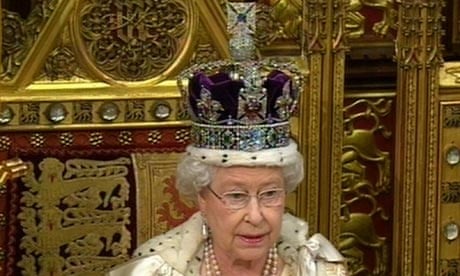Labour has accused the coalition government of an "abuse of power" after it announced the cancellation of next year's Queen's speech .
The cancellation comes as part of plans to permanently move the state opening of parliament from its traditional autumn date to the spring.
The change – announced by Sir George Young, the leader of the Commons, to tie in with the introduction of fixed-term parliaments – means the next Queen's speech will not take place until the spring of 2012.
Because the coalition introduced an 18-month legislative programme in May, the next speech had been due to take place next autumn. It will now be put back, subject to the fixed-term parliaments bill being passed.
The Speaker, John Bercow, granted the Labour backbencher Denis MacShane an emergency debate on the proposals.
The shadow leader of the Commons, Rosie Winterton, said: "This executive decision, made using the Queen's prerogative powers, has significant constitutional implications and is an abuse of power.
"Both the manner of this announcement, and its content, are an affront to parliament. There was no consultation whatever with the other parties. The Commons was not invited to give its views.
"There is no conceivable justification for this. It has been done solely to ease the passage of controversial legislation."
Under the fixed-term parliaments bill – getting its second reading today – general elections will take place on the first Thursday in May every five years.
Young said: "As a consequence, the government believes that it would be appropriate to move towards five 12-month sessions over a parliament, beginning and ending in the spring.
"This has the advantage of avoiding a final fifth session [beginning in the autumn] of only a few months, which restricts the ability of parliament to consider a full legislative programme."
The Queen's speech, drawn up by ministers but delivered by the monarch, sets out the government's legislative agenda for the coming period.
The current session of parliament will run until around Easter 2012, with the next state opening of parliament taking place shortly afterwards. The government believes the programme it set out in May is enough to take it through to that date.
But the shadow justice secretary, Jack Straw, said Young's announcement proved the government was "driven not by any coherent philosophy about constitutional change but by short-term, narrow party interests".
"It coincides with the publication of a fixed-term parliaments bill that has been rushed out without any opportunity for proper scrutiny," Straw said. "As a consequence, the bill is deeply flawed and will need substantial revision.
"It is astonishing that, contrary to all previous commitments, the government has abandoned any semblance of pre-legislative scrutiny on such fundamental constitutional legislation, tearing up election and post-election pledges before the ink on them is dry."
Young said the proposed change to spring-to-spring annual sessions would not result in fewer sitting days.

Comments (…)
Sign in or create your Guardian account to join the discussion